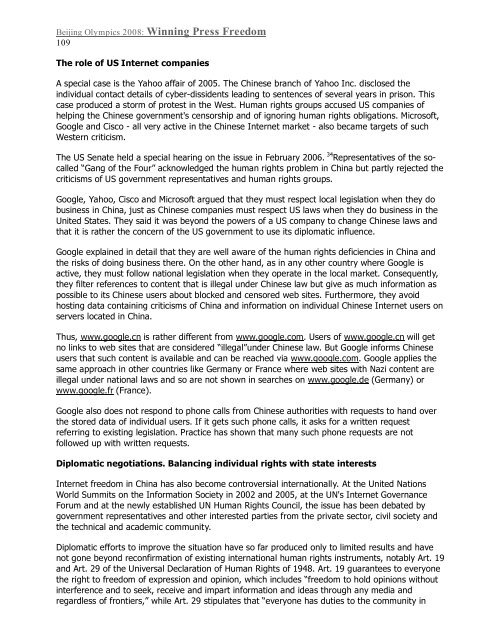Beijing Olympics 2008: Winning Press Freedom - World Press ...
Beijing Olympics 2008: Winning Press Freedom - World Press ...
Beijing Olympics 2008: Winning Press Freedom - World Press ...
You also want an ePaper? Increase the reach of your titles
YUMPU automatically turns print PDFs into web optimized ePapers that Google loves.
<strong>Beijing</strong> <strong>Olympics</strong> <strong>2008</strong>: <strong>Winning</strong> <strong>Press</strong> <strong>Freedom</strong><br />
109<br />
The role of US Internet companies<br />
A special case is the Yahoo affair of 2005. The Chinese branch of Yahoo Inc. disclosed the<br />
individual contact details of cyber-dissidents leading to sentences of several years in prison. This<br />
case produced a storm of protest in the West. Human rights groups accused US companies of<br />
helping the Chinese government's censorship and of ignoring human rights obligations. Microsoft,<br />
Google and Cisco - all very active in the Chinese Internet market - also became targets of such<br />
Western criticism.<br />
The US Senate held a special hearing on the issue in February 2006. 34 Representatives of the socalled<br />
“Gang of the Four” acknowledged the human rights problem in China but partly rejected the<br />
criticisms of US government representatives and human rights groups.<br />
Google, Yahoo, Cisco and Microsoft argued that they must respect local legislation when they do<br />
business in China, just as Chinese companies must respect US laws when they do business in the<br />
United States. They said it was beyond the powers of a US company to change Chinese laws and<br />
that it is rather the concern of the US government to use its diplomatic influence.<br />
Google explained in detail that they are well aware of the human rights deficiencies in China and<br />
the risks of doing business there. On the other hand, as in any other country where Google is<br />
active, they must follow national legislation when they operate in the local market. Consequently,<br />
they filter references to content that is illegal under Chinese law but give as much information as<br />
possible to its Chinese users about blocked and censored web sites. Furthermore, they avoid<br />
hosting data containing criticisms of China and information on individual Chinese Internet users on<br />
servers located in China.<br />
Thus, www.google.cn is rather different from www.google.com. Users of www.google.cn will get<br />
no links to web sites that are considered “illegal”under Chinese law. But Google informs Chinese<br />
users that such content is available and can be reached via www.google.com. Google applies the<br />
same approach in other countries like Germany or France where web sites with Nazi content are<br />
illegal under national laws and so are not shown in searches on www.google.de (Germany) or<br />
www.google.fr (France).<br />
Google also does not respond to phone calls from Chinese authorities with requests to hand over<br />
the stored data of individual users. If it gets such phone calls, it asks for a written request<br />
referring to existing legislation. Practice has shown that many such phone requests are not<br />
followed up with written requests.<br />
Diplomatic negotiations. Balancing individual rights with state interests<br />
Internet freedom in China has also become controversial internationally. At the United Nations<br />
<strong>World</strong> Summits on the Information Society in 2002 and 2005, at the UN's Internet Governance<br />
Forum and at the newly established UN Human Rights Council, the issue has been debated by<br />
government representatives and other interested parties from the private sector, civil society and<br />
the technical and academic community.<br />
Diplomatic efforts to improve the situation have so far produced only to limited results and have<br />
not gone beyond reconfirmation of existing international human rights instruments, notably Art. 19<br />
and Art. 29 of the Universal Declaration of Human Rights of 1948. Art. 19 guarantees to everyone<br />
the right to freedom of expression and opinion, which includes “freedom to hold opinions without<br />
interference and to seek, receive and impart information and ideas through any media and<br />
regardless of frontiers,” while Art. 29 stipulates that “everyone has duties to the community in





